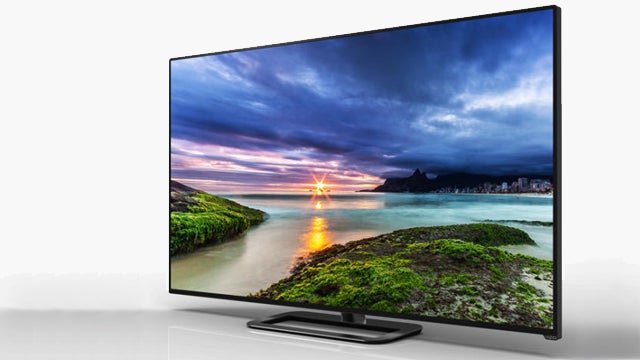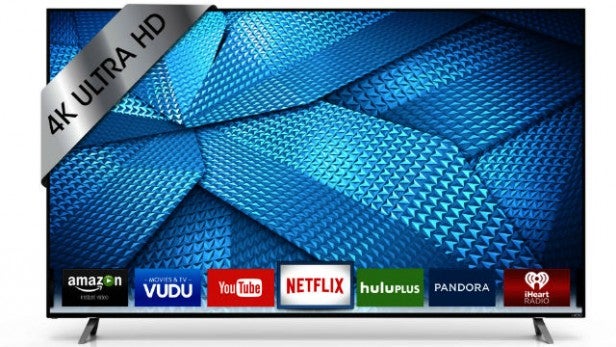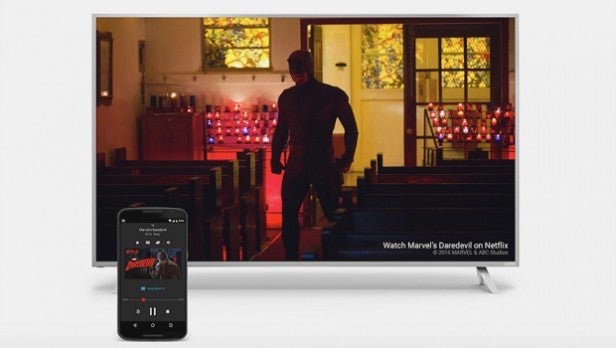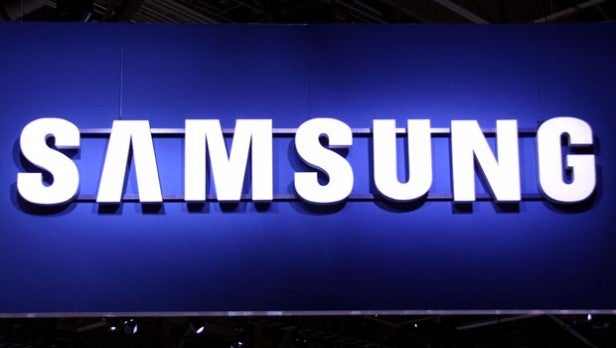Is your smart TV spying on you? All you need to know about smart TVs and your privacy

Is your smart TV spying on you? You may not have thought about it before, but now that Vizio has been caught spying on its users’ viewing habits, it might be time to consider just how private your TV viewing is. Here’s a full guide to what the fuss is all about, and how you can keep your viewing data private.
As if worrying about who can see what on social media, fretting about the next botnet attack, or anxiously awaiting the news that your details have been stolen in one of these ‘data breaches’ that seem to be all the rage right now wasn’t enough, you now have a new privacy problem to consider: watching TV.
Yes, US firm Vizio has agreed to pay a $2.2 million fine after being caught spying on its users’ viewing habits and selling the information on to make a tidy profit. And it goes way beyond just keeping track of which channel users were watching – there was some seriously dodgy-sounding stuff going on.
All of which should make you slightly uneasy about the whole ‘smart TV’ thing and just what data companies are capable of tracking. Luckily, we’ve got a whole explainer on the issue, and it’s right here for your reading pleasure and peace of mind.
Related: MWC 2017
What did Vizio actually do?
American company Vizio has just had to shell out $2.2 million (£1.8 million) after being fined for tracking what owners of its TVs had been watching. It’s a hefty sum for sure, so what exactly did Vizio do to warrant such financial punishment?
Well, the most egregious part of the whole debacle is the company’s use of Automatic Content Recognition. Essentially, this is software installed on the TVs which captures a selection of on-screen pixels every second the TV is on. These pixels are then matched with a database of TV, movie, and commercial content to figure out exactly what the user was watching.
Related: A complete guide to Facebook’s privacy settings
How many Vizio TVs were making use of this technology? Well, the company has sold 11 million smart TVs since 2010, and began snooping on content in 2014. But rather than simply installing automatic content recognition software on TVs from 2014 onwards, Vizio decided to update older sets with the ‘feature’ via a firmware update.
So if you bought a smart TV from the company in the last six or seven years, you’ve probably had your pixels snooped on. That is, unless you have a newer set which uses SmartCast. This is basically built-in Chromecast technology, and means ACR isn’t used.
Not content with identifying exactly what was on everyone’s screen every second of the day,
According to the US Federal Trade Commission (FTC), which fined the company for its data collection practice, Vizio gathered “as many as 100 billion data points a day from millions of TVs” – all of which was done without telling, or getting consent from users.
“Consumers didn’t know that while they were watching their TVs, Vizio was watching them,” the The FTC said. “The generic way the company described that feature – for example, ‘enables program offers and suggestions’ – didn’t give consumers the necessary heads-up to know that Vizio was tracking their TV’s every flicker.”
Related: TVs are entering a new era in 2017

Why did Vizio do it?
In short, to make money. Vizio obviously realised that selling off information about people’s viewing habits was a highly lucrative (not to mention, highly dubious) practice. Vizio shared what the FTC called a “mountain of data” with independent companies, including advertisers and audience engagement groups.
As the FTC puts it: “
Vizio maintains that the data it collected and shared wasn’t personally identifiable, and that information such as names or contact information was not included in the data. However, sensitive information such as sex, age, income, marital status, household size, and education was included.
What does Vizio have to say for itself?
Vizio has responded to the FTC’s lawsuit with the following statement from Jerry Huang, VIZIO General Counsel:
“VIZIO is pleased to reach this resolution with the FTC and the New Jersey Division of Consumer Affairs. Going forward, this resolution sets a new standard for best industry privacy practices for the collection and analysis of data collected from today’s internet-connected televisions and other home devices.
“The ACR program never paired viewing data with personally identifiable information such as name or contact information, and the Commission did not allege or contend otherwise. Instead, as the Complaint notes, the practices challenged by the government related only to the use of viewing data in the ‘aggregate’ to create summary reports measuring viewing audiences or behaviors.”
“Today, the FTC has made clear that all smart TV makers should get people’s consent before collecting and sharing television viewing information and VIZIO now is leading the way.”
The company has been told by the FTC to delete all the information it collected before March 2016, as well as being ordered to pay the fine.
WATCH: HDR and Hybrid Log Gamma explained
I have a Vizio TV – how do I make sure it’s not spying on me?
As we mentioned, Vizio has been ordered to delete all the data it collected prior to March 1, 2016, and the company will now deactivate the Automatic Content Recognition ‘feature’ on all its sets.
But if you’re a concerned Vizio TV owner, and want to make extra sure that the company isn’t collecting data from your viewing schedule, you can head into the TV’s menu and go to System>Reset & Admin>Smart Interactivity and click on the right arrow to turn the setting off.
Are other companies collecting data?
This is the most high profile case of a smart TV manufacturer collecting user data, but concerns over data privacy in relation to smart TVs have been around for some time. Vizio isn’t the only TV manufacturer that collects data, but it is the only company known to have sold off that information to outside services without consent.
So, what are other companies up to? Each manufacturer has its own privacy policy, so here’s a quick rundown of how each of the big TV companies treat personal data.
 Sony’s smart TV privacy policy explained
Sony’s smart TV privacy policy explained
Sony’s EU Privacy policy states the following, under the “Information we may collect when you use websites, products and services from Sony” section:
- Service, product or server logs, which hold information about your use of our service, product or websites, such as your IP address, browser information (including HTTP user agent strings), HTTP client request information and the time and location of your activities, domain, device and application settings, errors and hardware activity
- Information about where your device is physically located. For example, when you are using a geo-location service or application and you have provided consent to your location being shared
That seems more geared towards using the Sony website, though it does clearly say it also refers to using Sony products.
Related: Best TVs
Thankfully, Sony usually offers a fairly lucid set of privacy terms and conditions when you first set up your TV, so it should be fairly easy to opt out of any data collection scheme. What’s more, most high-end Sony sets are based on Android TV, which means Google’s own privacy conditions apply.
 LG’s smart TV privacy policy explained
LG’s smart TV privacy policy explained
As the company’s privacy policy states, LG collects data from Smart TV users for various purposes, including:
- to provide our Smart TV services
- to analyze, review and improve the products and services we offer
- to understand how customers are using LG Smart TVs
- to develop new products and services
- to provide you with a user-friendly navigation experience
- to protect and defend our rights and property, including by way of legal proceedings
- to collect payment for content you purchase
- for marketing
- for internal record keeping
- to deliver advertisements
Luckily, those using one of LG’s latest webOS TVs will be pleased to hear that LG doesn’t collect data on these newer sets – at least, according to Consumer Reports. If you have an older model, go to Option>Live Plus and turn off the feature. That should ensure your viewing is kept private.
Related: The big problem with HDR – and how to fix it
The company adds in its privacy policy:
“We may collect and use your Viewing Information to provide our Live Plus service as described above. Depending on which Smart TV service you are using, we may use your Viewing Information to provide you with recommendations of TV content that may be of interest to you, to contribute to aggregate statistics to determine the popularity of particular TV content, to serve you with advertisements for content, products, and services that may be of interest to you, to analyze how our services are being used, and make improvements to them.”
So, while it looks like LG is collecting data to bolster its own ability to offer you ads and generally annoying extra stuff, it’s still probably best to turn the Live Plus service off, just to be sure.
 Samsung’s smart TV privacy policy explained
Samsung’s smart TV privacy policy explained
Samsung has made its TV privacy policy easy to find, and compared to other companies, it’s much clearer. The most important part reads:
“If you enable the collection of information about video streams viewed on your SmartTV, we may collect that information and additional information about the network, channels, and programs that you view through the SmartTV. We will use such information to improve the recommendations that we deliver to you on the SmartTV.”
The best way to ensure your data is kept private is simply to opt out of viewing data tracking when you first turn the TV on. If you can’t remember whether you did or not, just go into your TV’s Smart Hub menu then go to Terms & Policy>SyncPlus and Marketing and turn it off. That menu should also let you turn off voice recognition, if you want to really lock your set down.
Related: What are quantum dots?
Otherwise, the company says it collects information to ‘highlight’ programmes and episodes of various shows that it thinks you will find interesting. When it comes to third parties, Samsung adds: “When you watch a video or access applications or content provided by a third-party, that provider may collect or receive information about your SmartTV (e.g., its IP address and device identifiers), the requested transaction (e.g., your request to buy or rent the video), and your use of the application or service.”
How to stop your smart TV from spying on you
If this whole Vizio debacle has got you worried, there are a few things you can do to make sure your TV isn’t sending a load of personal viewing data back to the company that made your set.
The most obvious is to avoid the smart aspect of your TV altogether by disconnecting it from the internet. Of course, this applies to those that don’t rely on the smart features, but with set-top box and dongle offerings from companies such as Amazon and Google providing a much more refined experience than most smart TV interfaces, you don’t actually have to rely on their TV’s built-in interface for ‘smart’ features.
That said, don’t think that these companies aren’t collecting some data on you – any streaming service worth its chunk of your bandwidth will have a recommendations feature that highlights content it thinks you’ll like, based on what you’ve already watched. However, this data will usually be harvested anonymously, so your soft spot for Selena Gomez flicks should be safe – check the terms and conditions of the streaming services or devices you use if you’re concerned.
Other than that, using the steps outlined above for TVs from specific manufacturers should help you keep your viewing data private.
Related: Best VPNs
WATCH: Best TVs at CES
Let us know in the comments if you’ve got any suggestions when it comes to TV viewing privacy.

 Sony’s smart TV privacy policy explained
Sony’s smart TV privacy policy explained LG’s smart TV privacy policy explained
LG’s smart TV privacy policy explained Samsung’s smart TV privacy policy explained
Samsung’s smart TV privacy policy explained